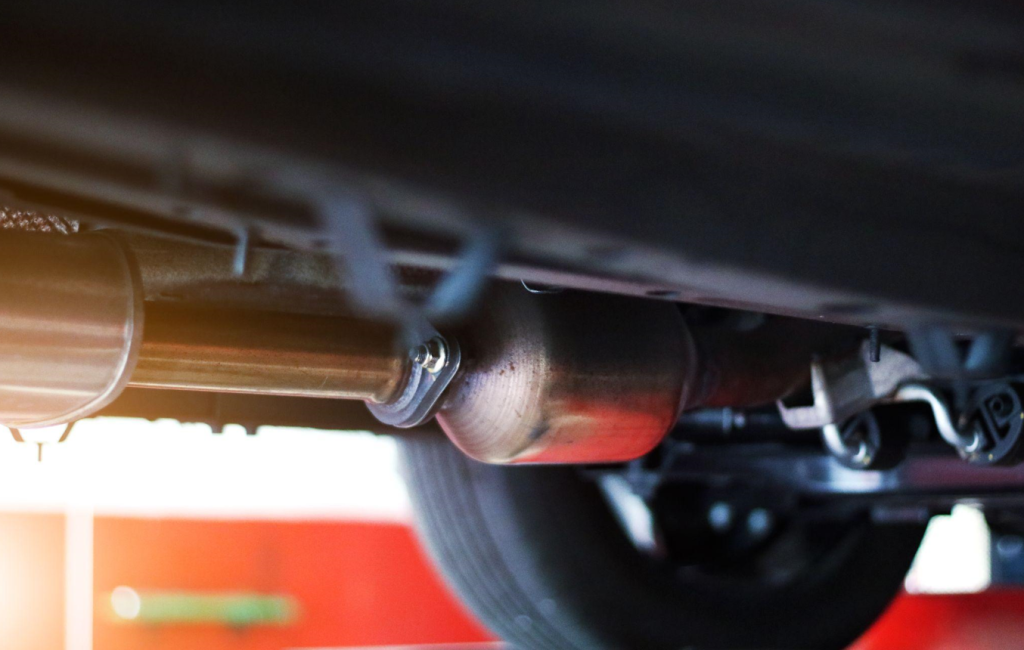Theft of catalytic converters has surged in recent years, leaving many vehicle owners facing unexpected replacement costs. However, there are effective measures you can take to protect your vehicle and reduce your risk of theft. Let’s go over why thieves steal catalytic converters, explore practical tips to safeguard your catalytic converter, and discuss the importance of understanding your car insurance coverage in such scenarios.

Understanding Catalytic Converters
Catalytic converters convert the harmful gases your engine produces into less toxic substances before they’re emitted into the atmosphere. This process helps to drastically reduce the amount of pollutants released into the environment, contributing to cleaner air and a healthier planet.
The key to this transformation lies in the precious metals that comprise the core of catalytic converters. These typically contain a mix of platinum, palladium, and rhodium — elements that are rare and highly valuable. These metals serve as catalysts, speeding up the chemical reactions that convert harmful gases into safer substances.
Why Do People Steal Catalytic Converters?
Criminals steal catalytic converters because they contain valuable precious metals. The converters can be removed quickly and easily with a saw or similar tool, and the lack of serial numbers makes it difficult to identify stolen items, making them an attractive target for thieves.
Signs of Catalytic Converter Theft
Detecting catalytic converter theft can be tricky, especially if you’re unfamiliar with your car’s components. However, several telltale signs can help you determine whether your vehicle has fallen victim to this crime:
- Loud, rumbling sound as soon as you turn on the engine
- Reduced engine performance, like decreased acceleration or fuel efficiency
- Check engine light appears on your dashboard
- Dark, unusual exhaust emissions
If you suspect theft, safely inspect the underside of your vehicle. The catalytic converter is a large metal component of the exhaust system located between the engine and the muffler. If it’s missing, you’ll likely see a severed pipe or evidence of a rough cut.
Can You Drive Without a Catalytic Converter?
Technically, you can still drive your car without a catalytic converter. However, it’s not recommended. Without a catalytic converter, your vehicle will release harmful pollutants directly into the environment. Due to this environmental harm, many jurisdictions have laws forbidding you to drive without a catalytic converter. Additionally, you may notice a decrease in fuel efficiency and overall performance.
Tips to Prevent Catalytic Converter Theft
Implementing a few strategic practices can significantly reduce the risk of becoming a target of theft.
- Park in well-lit areas with surveillance: Thieves usually target cars in dark, isolated areas where they can work undetected. Parking your car in a well-lit area, preferably under a streetlight or in a monitored parking lot, can significantly deter potential thieves.
- Use catalytic converter locks and shields: These devices are designed to cover your catalytic converter, making it harder for thieves to remove. They can be a valuable investment if catalytic converter theft is common in your area.
- Etching or marking your catalytic converter for identification: Etching your vehicle identification number (VIN) or another unique identifier onto your catalytic converter can help law enforcement track it down if it’s stolen. It can also discourage thieves, who prefer unmarked parts that are harder to trace.
- Alarm systems and other deterrents: Investing in a car alarm system that triggers a loud sound when it detects vibration or movement can be an effective deterrent. Some systems are sophisticated enough to detect the specific vibrations associated with catalytic converter theft. You can also consider deterrents such as motion-activated lights or security cameras.
- Community awareness: Staying engaged with your local community can be one of the best defenses against catalytic converter theft. If there have been thefts in your area, make sure your neighbors are aware and encourage them to take preventative measures, too.
Working with Auto Repair Shops
How much does it cost to replace a catalytic converter? The cost can range anywhere from $300 to $2,500. Some factors influence the replacement cost, including:
- Make and model: Your car’s make and model significantly influences the cost of a new catalytic converter. Luxury or high-performance vehicles often require more expensive parts compared to standard models.
- Type of catalytic converter: There are two main types of catalytic converters: universal and direct-fit. Universal converters are generally cheaper but may require additional labor to fit into your vehicle. On the other hand, direct-fit converters are designed to fit specific car models but are typically more expensive.
- Labor costs: Labor costs can also vary greatly depending on your location and the complexity of the installation. Some catalytic converters can be more difficult to access and replace, leading to higher labor costs.
Insurance Coverage
Replacing a catalytic converter can be expensive, so you might wonder: Does insurance cover catalytic converter theft? If you have comprehensive insurance, it generally covers the theft of car parts, including the catalytic converter. This means that your insurance policy will likely cover the cost of replacing the converter and any necessary repairs to your vehicle, minus your deductible. For example, if your deductible is $500 and the total cost to replace the catalytic converter is $1,500, you would pay $500, and your insurance would cover the remaining $1,000.
How do car insurance claims work? When making a claim, provide your insurance company with as much information as possible, including the police report, photos of the damage, and an auto repair shop estimate. The more detailed your claim, the smoother the process should be.
Catalytic converter theft is a growing problem, but by staying informed and proactive, you can significantly reduce your risk. If you do fall victim to catalytic converter theft, know that while the replacement can be expensive, comprehensive auto insurance can help offset some of these costs.






